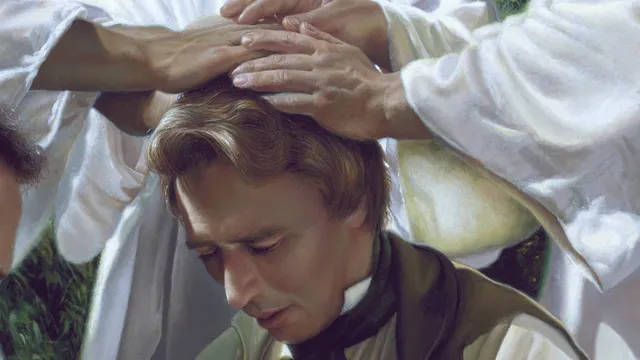
FAIR is a non-profit organization dedicated to providing well-documented answers to criticisms of the doctrine, practice, and history of The Church of Jesus Christ of Latter-day Saints.
FAIR › Scripture Study Resources: Supplement Your Come, Follow Me Study › Study Resources for the Doctrine & Covenants and Church History › Week 31 Power of Godliness
DOCTRINE AND COVENANTS 84

This truth extends to both men and women, reinforcing that priesthood power is not limited to those who hold priesthood offices but is available to all covenant keepers. When individuals participate in priesthood ordinances with faith, they invite divine power into their lives, allowing them to overcome challenges and receive guidance. (President Russell M. Nelson, “Spiritual Treasures“)
Unlike mere ordination, which is a formal bestowal of priesthood authority, obtaining and receiving the priesthood entails personal righteousness and active faith. The Lord promises eternal blessings to those who magnify their callings and live worthy of their priesthood responsibilities. (Doctrine and Covenants 84:31-44)
The temple plays a crucial role in unlocking the full blessings of the priesthood. Ordinances such as the endowment and sealing provide men and women with divine power that strengthens them in their callings and personal discipleship. The priesthood is not merely about authority but is a means through which individuals can access God’s strength and guidance. (Elder Paul B. Pieper, “Revealed Realities of Mortality“)
Just as physical nourishment sustains the body, spiritual nourishment through the scriptures strengthens faith. When individuals regularly engage with God’s word, they experience increased peace, understanding, and direction in their daily lives. This principle underscores the importance of making scripture study a priority. (2 Nephi 32:3)
If you have questions on this week’s reading, please email your questions to us here.
Practical solutions for someone in faith crisis:
Action Step: Regularly participate in priesthood ordinances and seek God’s help in applying their power.
The priesthood is not just about Church governance but is a source of divine strength, guidance, and healing. By actively seeking its power, individuals can feel closer to God and find help in overcoming challenges.
Encouraging Thought:
Action Step: Set personal goals to magnify priesthood responsibilities and deepen understanding of priesthood power.
The Lord promises immense blessings to those who uphold their priesthood commitments. Greater devotion to these covenants results in increased spiritual strength, revelation, and eternal rewards.
Encouraging Thought:
The Lord promises that those who diligently seek His word will be filled with light (Doctrine and Covenants 84:43-45). Consistent scripture study enhances spiritual discernment and strengthens faith.
Encouraging Thought:
Elder Richard G. Scott said, “Feasting on the word of God each day is more important than sleep, school, work, television, or social media.”
Objective: Help learners understand how priesthood ordinances make the power of godliness manifest in their lives.
A locked box with a small item inside, key(s), scriptures, whiteboard, markers.
Activity Steps:
Follow-Up Question: How can we more fully unlock the power of priesthood ordinances in our lives?
Objective: Teach the importance of faithfully keeping the oath and covenant of the priesthood.
Puzzle pieces (write covenant-related words on each), scriptures, chalkboard.
Activity Steps:
Introduction (5 min): Show incomplete puzzle pieces and ask what happens when a piece is missing. Relate this to covenants—we must fulfill our part for the whole picture to be complete.
Scripture Discussion (5 min): Read Doctrine and Covenants 84:31-44, emphasizing that priesthood covenants require action. Discuss key phrases like “magnify” and “obtain.”
Application (5 min): Have learners match puzzle pieces with covenant-related principles (e.g., service, obedience, temple worship). Discuss real-life applications.
Follow-Up Question: How have you seen the blessings of keeping covenants in your own life?
Objective: Inspire learners to seek truth and spiritual enlightenment through God’s word.
A flashlight or candle, a darkened room (if possible), scriptures.
Activity Steps:
Introduction (5 min): Turn off the lights or darken the room. Ask learners how they feel in darkness. Then turn on a flashlight or candle and discuss how light helps us see clearly.
Scripture Discussion (5 min): Read Doctrine and Covenants 84:43-45, where the Lord compares His word to light. Discuss how consistent scripture study increases spiritual clarity.
Application (5 min): Have learners write down one way they can improve their scripture study this week. Invite them to set a goal.
Follow-Up Question: How have you seen God’s light grow in your life through His word?
Doctrine and Covenants 84:19-21 – The power of godliness through priesthood ordinances.
2 Nephi 32:3 – Feasting on the word of Christ brings light and truth.

FAIR is a non-profit organization dedicated to providing well-documented answers to criticisms of the doctrine, practice, and history of The Church of Jesus Christ of Latter-day Saints.
We are a volunteer organization. We invite you to give back.
Donate Now